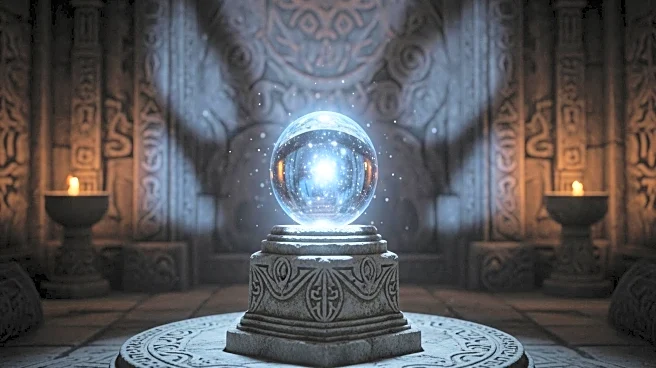What's Happening?
The animated film 'Kpop Demon Hunters,' directed by Maggie Kang and Chris Appelhans, has become Netflix's most-watched original animated film since its release on June 20, 2025. The movie follows the story of Rumi, Mira, and Zoey, members of the K-pop supergroup HUNTR/X, who double as demon hunters. They face a supernatural threat from a rival boy band, the Saja Boys, who are demons in disguise. The film has been praised for its animation, plot, and music, achieving a 97% score on Rotten Tomatoes. While the directors have wrapped up the main characters' stories, they have hinted at the possibility of expanding the universe with sequels or spin-offs, though a continuation of the original story seems unlikely.
Why It's Important?
The success of 'Kpop Demon Hunters' highlights the growing influence of K-pop culture in global entertainment, particularly in animation. The film's popularity could lead to more projects that blend music and storytelling, potentially increasing the representation of Asian culture in mainstream media. The potential for sequels or spin-offs could further solidify Netflix's position in the animated film market, attracting more viewers and subscribers interested in diverse content. Additionally, the film's success may encourage other studios to explore similar themes, contributing to a broader acceptance and integration of K-pop and Asian narratives in Western entertainment.
What's Next?
While a direct sequel to 'Kpop Demon Hunters' is uncertain, the directors and Netflix are considering expanding the universe through spin-offs or other adaptations. This could involve new characters or storylines that explore different aspects of the film's world. The potential for live-action adaptations has been discussed, although no official plans have been announced. Fans of the film can expect more content related to the franchise, possibly including new music collaborations with K-pop idols, which could enhance the film's appeal and reach.
Beyond the Headlines
The film's success underscores the cultural exchange between East and West, as K-pop continues to influence global entertainment trends. This phenomenon reflects a shift towards more inclusive storytelling that embraces diverse cultural backgrounds. The integration of K-pop elements into mainstream media could lead to increased opportunities for Asian artists and creators, fostering a more multicultural entertainment landscape. Additionally, the film's focus on music and animation may inspire new creative collaborations across industries, further blurring the lines between different forms of artistic expression.











